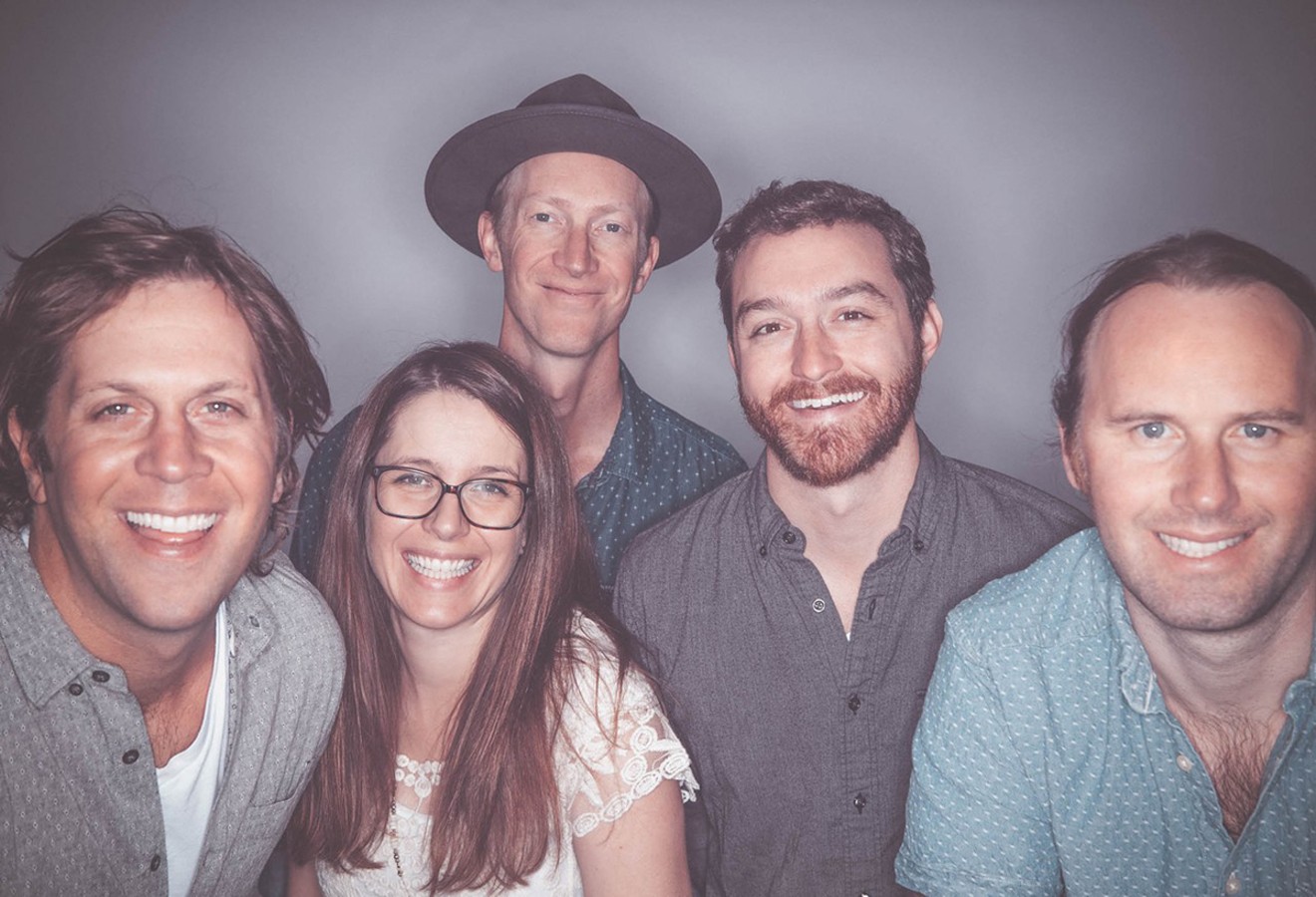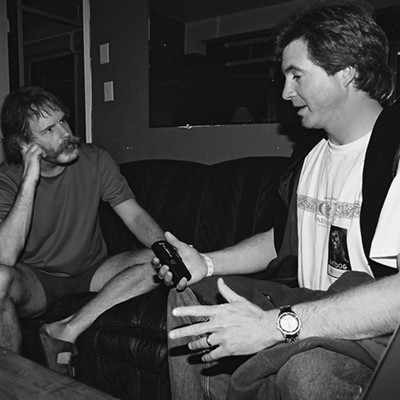Travis McNamara is packaging Kickstarter rewards for his band’s most recent CD drive. It’s been a slow burn for Trout Steak Revival, which began in 2009, but since 2014, the Denver-based bluegrass act has caught fire.
The group has roots in Michigan, where a few of its members started out strumming acoustic covers at a summer camp. But it wasn’t until the flatlanders migrated to the foothills of Colorado and pooled in Denver that they eventually found their own voice.
“We played our first shows as the house band at a tiny, log cabin-like place called the Bucksnort Saloon in Sphinx Park, just off of 285,” says McNamara, who plays banjo for Trout Steak. “It was a little out of the way, but what a classic spot.”
After getting a taste of the hills, the band moved down to Denver, where it landed a weekly residency at Pasquini’s Pizzeria.
“It was mostly a casual thing where our friends could come have a few beers and listen to us on the weekends,” says McNamara, 32, who first became acquainted with the Mile High City while traveling between home and college.
“When I was living in the Midwest and going to school in Washington, I used to make the drive to the West Coast a lot,” he explains. “Denver is right in the middle, at about the seventeen-hour point. I’d call up my friends [now bandmates] Will and Casey, who were living in town, and crash on their couch. I’d have these great weekends where the sun was shining, there was great beer and beautiful women, and I got to hike and play music. I’d always drive away thinking, why am I not living here?”
After college ended, McNamara made his way back to the Front Range and his future.
Trout Steak Revival started with multiple acoustic guitarists who quickly decided to diversify their instrumentation in order to accommodate a newfound appreciation for an old-time string band sound. McNamara switched over to the banjo, while his bandmates learned to play mandolin and dobro, among other instruments.
“I always loved country, and we liked to play songs by Neil Young, the Band, Bob Dylan, Jerry Garcia and David Grisman, but not a huge amount of bluegrass,” says McNamara. “We’d been in indie-rock bands and blues bands before, but coming out to Colorado and its festivals and playing around the campfires exposed us to the common language of old-time music and bluegrass. It’s been really fun to learn how to play it, but also to blend in the stuff that we grew up with. That’s kind of the Trout Steak sound. People call us progressive bluegrass, folkgrass or Colorado bluegrass, but we don’t stick to traditional boundaries. We have a more inclusive approach. We love good songs and try to bring high energy and positivity when we play.”
After taking third place at the RockyGrass festival in Lyons in 2012, the musicians continued to hone their picking skills and vocal harmonies in Denver, including at a regular stint at the now-defunct Park House on Colfax. The string-band gods finally smiled upon the group, and its efforts paid off at the legendary Telluride Bluegrass Festival in 2014, when the upbeat outfit captured top honors in the band competition.
“Telluride was definitely a big turning point for us,” says Trout Steak fiddle player Bevin Foley, a 36-year-old classically trained violinist who holds a degree in music from the University of Denver and is the lone woman in the group. “Winning that contest provided a lot of new opportunities and invitations that allowed us to go on the road. As a result, we’ve been touring nationally for about two and a half years now. We have a pretty good fan base in Oregon, and we’re building up in the Southeast, but Colorado remains as our biggest market. We like to play outdoor festivals like WinterWonderGrass and Campout for the Cause. And locally, we’ve played at the Bluebird and the Gothic, among other venues.”
Foley, a Denver native who met the band shortly after its arrival in Denver, estimates that Trout Steak currently plays about 120 shows per year. Her first encounter with the group was at the Walnut Room in 2009, when she was hosting an annual event called Green Beer and Bluegrass.
“I hired the group to perform,” says Foley, who started playing the violin at age seven and has been playing old-time and bluegrass music on her fiddle for about fifteen years. “It was an annual St. Patrick’s Day thing that I did for a while. After meeting them all and listening to them play, we started hanging out at a few different bluegrass picks and jamming together. And when one of their original members moved back to Michigan, I stepped into the lineup.”
Trout Steak just released its fourth album, Spirit to the Sea. The project is produced by well-regarded banjoist Chris Pandolfi. Pandolfi also produced the group’s 2014 release, Brighter Every Day. He first met McNamara at RockyGrass Academy on the Planet Bluegrass Ranch in Lyons in 2012, where Pandolfi served as an instructor to the aspiring Trout plucker. The two became friends, and the stage was set for future recording collaborations.
“Spirit is my second album working with them, so I’ve gotten to know what makes them tick,” says Pandolfi, whose band, the Infamous Stringdusters, also considers Denver its unofficial home. “I try to tell them what I believe will make the best result. The thing that stands out to me is to capture their real sound in the studio. The studio can trick you into thinking that it can allow you to craft a sound that you might not normally have, and sometimes that can happen, but I think that the most important thing is to harness the skill that they have built up, which is how to make music collectively. The magic of their music lies in their playing as a group.”
Pandolfi knows what he’s talking about: The forward-leaning Stringdusters comprise a well-oiled touring and recording act that, along with receiving several awards from the International Bluegrass Music Association, has earned a Grammy nomination.
Widely regarded as a musically omnivorous ambassador for bluegrass, Pandolfi logged time at the Berklee School of Music and then lived in Nashville for a time before settling in Denver. He is in demand as a player and producer who effectively pushes genre boundaries.
“I like to squeeze in a few projects a year when I can,” Pandolfi says. “I got into producing because with my own band, it’s one of the elements of the process that I always enjoyed. Writing music and bringing it to light in the context of a recording studio, with the writing, the arranging and the mixing, is a process that I’ve embraced and have found that I do well.”
The award-winning banjoist, who also fronts a Denver-hosted project with an impressive rotating super lineup called the Bluegrass Generals, has produced his own recordings in addition to working with Trout Steak and a few others. He says he’s proud to call Colorado home.
“I would say Denver is a growing base for bluegrass music in general nowadays,” he muses. “Most people associate it with the South and its roots in Kentucky, and certain strains of bluegrass will always be perpetuated in those parts, but at this point, there is a great long history of bluegrass in the state of Colorado that has its own iterations and its own evolution separate from the Southeast — though equally valid and more popular, if you look at the numbers and the people coming out to see the strain of bluegrass that bands like Trout Steak Revival represents. Colorado has proven to be a very fertile area with great players, amazing fans and venues and, ultimately, just a lot of good opportunities. It’s certainly hitting its stride.”
Foley points out that the bluegrass community in Colorado and beyond has begun to include more women in bands as well as at festivals.
“I think that the industry is becoming more and more welcoming to women all the time — though I have definitely been hanging out with a lot of boys,” she concedes with a laugh. “People have taken notice, though, and promoters have started to incorporate female bands and performers.”
As for the curious Trout Steak name, Foley says the original members coined the moniker during a wet and dreary backpacking trip in the Sawatch Mountain Range of the state.
“The guys took a camping trip and were expecting to catch most of their food,” she says. “They planned on eating trout every night. But it didn’t turn out that way. They got rained on a lot and spent a lot of time in their tents. At one point on that trip, they decided that they wanted to start a band. And at a later point, when they had gotten really hungry and had sent one person out to catch a fish in the morning, someone shouted, ‘Bring me a trout steak!’ So that’s how the name got started. You need a big trout to get a trout steak, by the way. I think the name also falls into the lore of catching a really big fish.”
Trout Steak Revival, Friday, November 10, Ophelia’s Electric Soapbox, 1215 20th Street, 303-993-8023, $22-$42; November 17, Aggie Theatre, 204 South College Avenue, Fort Collins, 970-482-8300; November 18, Cervantes, 2637 Welton Street, 303-297-1772; December 1, Fox Theatre, 13th Street Boulder, CO, 303-447-0095.
[
{
"name": "Air - MediumRectangle - Inline Content - Mobile Display Size",
"component": "12017618",
"insertPoint": "2",
"requiredCountToDisplay": "2"
},{
"name": "Editor Picks",
"component": "17242653",
"insertPoint": "4",
"requiredCountToDisplay": "1"
},{
"name": "Inline Links",
"component": "18838239",
"insertPoint": "8th",
"startingPoint": 8,
"requiredCountToDisplay": "7",
"maxInsertions": 25
},{
"name": "Air - MediumRectangle - Combo - Inline Content",
"component": "17261320",
"insertPoint": "8th",
"startingPoint": 8,
"requiredCountToDisplay": "7",
"maxInsertions": 25
},{
"name": "Inline Links",
"component": "18838239",
"insertPoint": "8th",
"startingPoint": 12,
"requiredCountToDisplay": "11",
"maxInsertions": 25
},{
"name": "Air - Leaderboard Tower - Combo - Inline Content",
"component": "17261321",
"insertPoint": "8th",
"startingPoint": 12,
"requiredCountToDisplay": "11",
"maxInsertions": 25
}
]












